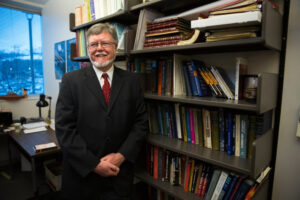The Future of Physics Education
April 1, 2024
Above: Ricardo Gonzalez, REFUGES Afterschool Program Coordinator in class. Credit: Todd Anderson
The March issue of Nature Physics, a premier academic publication, was all about education. Physics Education Research (PER) is a scientific field of study in which researchers collect and analyze data related to the learning environment.

Ramón Barthelemy
“Physics curricula and education systems have remained largely unchanged for decades, and much can be done to improve them,” reads the issue’s editorial. “Nature Physics provides an overview of the current state of physics education research and offers recommendations on how to make learning environments more equitable and inclusive, diversify graduates’ skillsets and enable them to tackle important societal issues and challenges.”
The editors hand-picked contributors who focus on PER from varying perspectives. Ramón Barthelemy, assistant professor in the U’s Department of Physics & Astronomy and founder of the PERU Group, was co-author of a comment titled “Racial equity in physics education research.” AtTheU spoke with Barthelemy about his contribution to the landmark issue.
Nature Physics doesn’t typically focus on education. Was this issue a big deal?
Yes, it is! The editors reached out to my wonderful colleague, Dr. Geraldine Cochran at Ohio State, who brought in a bunch of folks from the U.S. and Brazil. I was excited to hear that Nature Physics chose to include a racial equity perspective in their journal, and I was excited that Dr. Cochran invited me to participate.
How did you and your co-authors decide which aspects of racial equity in PER to include?
Dr. Cochran made the overall framework, and within that, each one of us brought our unique perspective. For me, it was really important that we at least mention LGBTQ+ communities, for example. We are very intersectional in the work that we’re doing. The main focus is race, but you can’t talk about race and ignore the sociocultural, sociohistorical, sociopolitical differences that really impact people.
A big focus of all physics education research is identity—how can we get all students to see themselves as physicists? When we talk about one identity category, we have to think about it in terms of other categories as well—gender identity, sexual identity, income level, whether your parents went to college or not, and so on. I was just happy to work with a group of people that recognize that it’s not just the one thing that affects us, it’s all things that affect our success in physics.
Why is identity an important aspect to the physics education research field?
Physics historically has had one of the biggest challenges in terms of not only diversifying representation in the field, but also diversifying the experience of being a physicist. When we look across the physics literature, we’re not seeing gains in the experiences of women, People of Color and LGBTQ+ folks that we’d like to see. The same issues that people talked about in the seventies and the nineties are the same issues that people are talking about when I and my colleagues interview them today in our own research. So, we have to keep this at the forefront of the broader physics education conversation, because physics just isn’t seeing the kind of change that we are seeing in other fields, unfortunately.
Read the entire interview conducted by Science Writer Lisa Potter in @TheU




